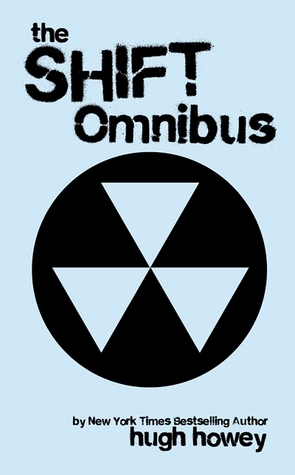After reading Wool, the first book I’d read by Hugh Howey and one that has critics and fans alike raving, I was hooked. Quite simply, the entire concept behind Wool, the sparse and heart-achingly gorgeous writing, the characters and what they endured and survived (or didn’t) had me wanting to read and know more by this author and about this world – our world in a future that we can only hope is never realized.

Imagine my delight when I discover that Shift is the prequel to Wool – this is the book that comes to explain the Silos, their purpose and the terrible choices that led what’s left of humanity there.
Written as parallel narratives – one from the point of view of Troy, a technician and leader in a Silo in the future and one from the perspective of Donald, a budding politician in contemporary times swept up in a tide of power, corruption and the assertion of a skewed morality that has deathly consequences, Shift is a commanding but sometimes difficult book. The writing is very good but lacks the elegiac flow that Wool often displayed.
Gaps and omissions mean that the reader is trusted to put some of the pieces of this comp;ex jigsaw together and, while many have no doubt succeeded, I was often left scratching my head and needing to reread sections to understand what I missed – how A plus B led to G. I confess, it didn’t always work and I am still wondering about aspects of the novel but not enough to go back.
I guess that’s another difference between Shift and Wool. In Wool, I really cared about the characters – I was invested so heavily in their futures and choices, I wept, cried aloud in fear, shouted for joy, even over the most simple of things. Here, I didn’t like them nearly as much and often felt indifferent when they exited the chapter or tale. I do wonder, however, if this was a deliberate strategy on the part of Howey for what is clear is the obejctivity that was required to create the world of Shift and Wool, the utter conviction in a moral code that doesn’t allow for detractors or questioning – to do so is weak and threatening and both must be eliminated.
So while Shift, by segueing back and forth, reveals the building of the Silos, the politicking and manipulations as well as the ethically fraught reasons behind them – what led to and the rationale for their being inhabited, it’s not always clear-cut or easy to unearth – but perhaps that’s the point. Certainly, towards the end of the book, once the notion of hierarchy within the silos and the way habits and idiosyncrasies are formed is established, characters who you can identify with and feel sympathy for, including some from Wool, emerge.
I look forward to the next installment to see how Howey will bridge the then and now and move into the future. His imagination is fierce and boundless, unlike the Silos, and his way of expressing possibility, seductive.
